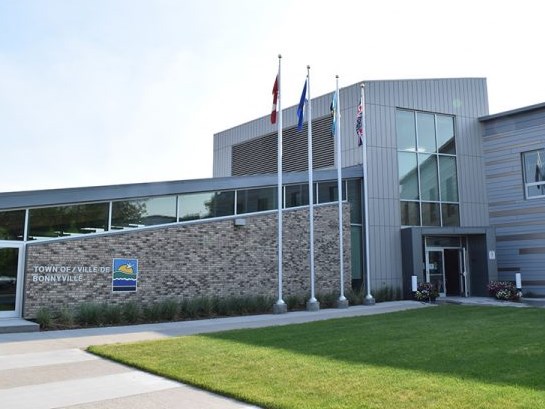BONNYVILLE – The Town of Bonnyville has received a passing audit of its 2021 financials according to an independent auditor report by Wilde and Company Chartered Professional Accountants.
“In our opinion, the financial statements present fairly in all material respects, meaning that we have issued a clean audit,” said Aimee Campbell, at the Town’s regular council meeting on April 12.
During the presentation of the report, it was noted that overall revenue the Town budgeted for in 2021 was $17.9 million compared to $18.1 million that was earned.
The report attributed this difference in revenue to governmental transfers for operations.
Expenses came in at $22.9 million leaving a deficit of $4.7 million before factoring in government capital transfers of $16.3 million and the transfer of capital assets worth $92 million.
Accumulated surplus
The accumulated surplus at the end of year was significantly lower than what had been expected. The actual accumulated surplus for 2021 is $156 million. It was estimated to come in at $251 million.
Campbell explained the reduction in accumulated surplus was result of the Town's $92 million waterline asset transfer that translated to a $79 million deficiency but does not provide a true reflection of the actual year’s finances.
In fact, the Town of Bonnyville saw a $7.5 million increase in cash flow and cash equivalents in 2021 compared to the previous year.
There was also an increase in the budgeted revenue due to the completion of an Intermunicipal Collaboratives Framework (ICF) agreement with the MD of Bonnyville, as well as operating grants being contributed to the Bonnyville Regional Water Services Commission (BRWC) for cost overruns.
As well, the Town’s financial cash assets increased by approximately $1.2 million mainly as a result of funding remaining from the ID 349 agreement.
When it came to accounts payable and accrued liabilities, this decreased by approximately $2.7 million due to waterline contracts coming to an end and holdbacks being released following the completion of the regional waterline.
Assets
A large change in the Town’s non-financial assets - tangible capital assets - was highlighted in relation to the sale of the Bonnyville Airport to the MD in 2020, as well as the transfer of the waterlines to the BRWC.
The transfer of the waterline equated to a roughly $92 million decrease in assets but was partially offset by new assets that were purchased in 2021 by the Town. The Town's total non-financial assets are about $137 million.
The net financial assets at the end of the year were higher than what had been budgeted. The actual net financial asset for 2021 was $18.9 million. It was expected to come in at $16 million.
The Town started the year with $11.3 million worth of financial assets.
Expenses
The Town budgeted $22.87 million for expenses and spent $22.93 million, which is overall very consistent.
However, a few areas saw significant changes. With regard to roads, there was an increase of roughly $830,000.
This is due to increased wages, street repairs, and increased costs associated with materials, streetlight power and leasing equipment.
Water supply and distribution also saw an increase of about $1.1 million compared to the prior year.
“This is due to wage allocation and an increase in the purchase of water from the commission versus water treatment plant costs, as well as cost runs paid to the commission related to the water line,” said Campbell.
Adding value to the Town’s bottom line was the Bonnyville and District Centennial Centre and the Beau Vista Subdivision, which contributed $1.3 million in capital to the municipality.
Several departments, including culture, parks and recreation, land use planning, zoning and development, saw funding come in well below what was budgeted for.
Tax contributions
In 2021, the Town received $10.83 million in property taxes, a slight decrease from what was budgeted.
Government grants in place of property taxes matched exactly at $61,331.
The Town pulled in slightly less than they had anticipated for its tax requisitions for schools and seniors housing. The Town received $2.87 million for the Alberta School Foundation Fund and $53,559 for the Lakeland Senior Foundation.
Net municipal Taxes received by the Town came in slightly under budget at $7.965 million.
Preparing municipal landfills for retirement
Following the review of the financial audit, Campbell pointed to changes in Alberta’s Environmental Law, which will have a direct impact on the Town’s future liability and asset accounting.
The new accounting standard will transition the Landfill Closure and Post-Closure Liability to an Asset Retirement Obligation.
The audit report indicated that “the Town has not designated assets for setting closure and post-closure liabilities of the new Class Ill (landfill) site. The life expectancy of the new site is in excess of 40 years.”
These changes must be completed by the 2022 or 2023 year end and involve obtaining a third-party engineering report to support the value of the assessment to ensure that it's set at the right amount, she said.
Alberta environmental law requires closure and post-closure care of landfill sites, which includes final covering and landscaping, pumping of ground water and leachates from the site, and ongoing environmental monitoring, site Inspections and maintenance.
In 2021, the Town made payments totalling $421,914 to the Beaver River Regional Waste Management Commission, according to the report. The year prior the municipality paid $415,955 to the commission.



